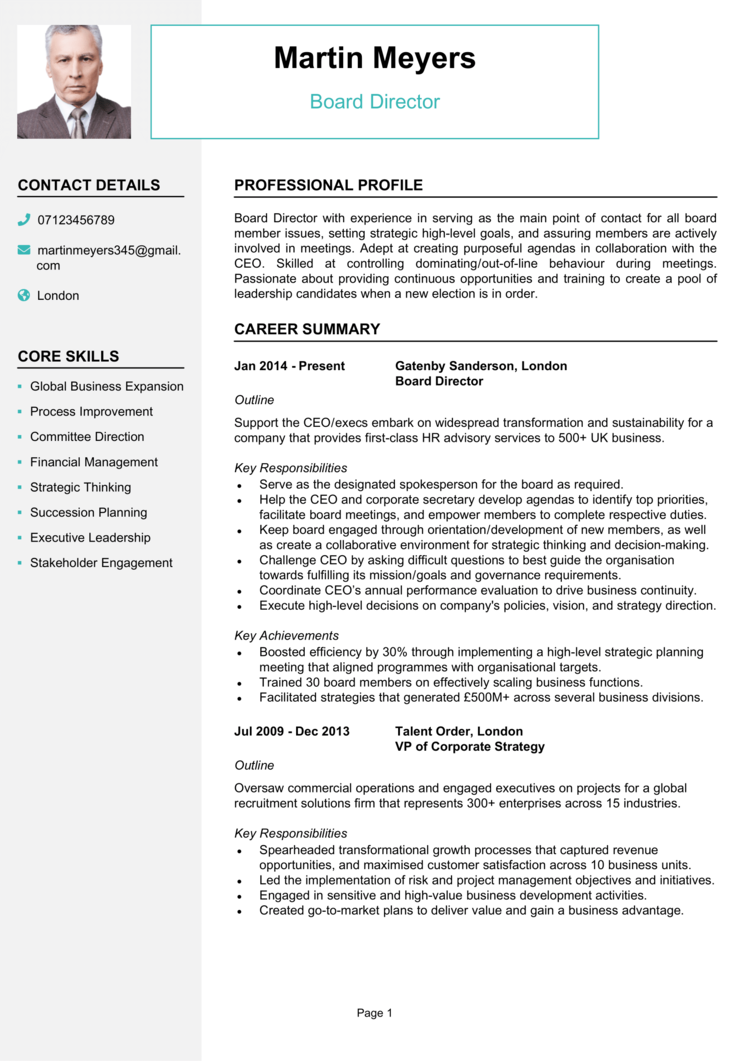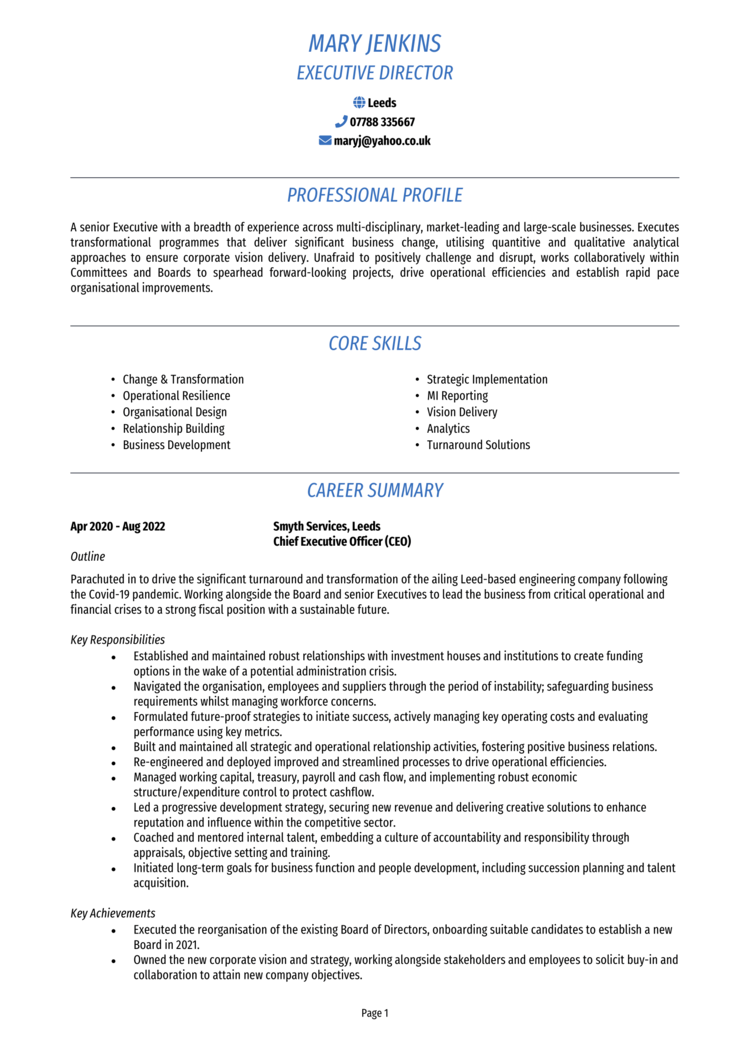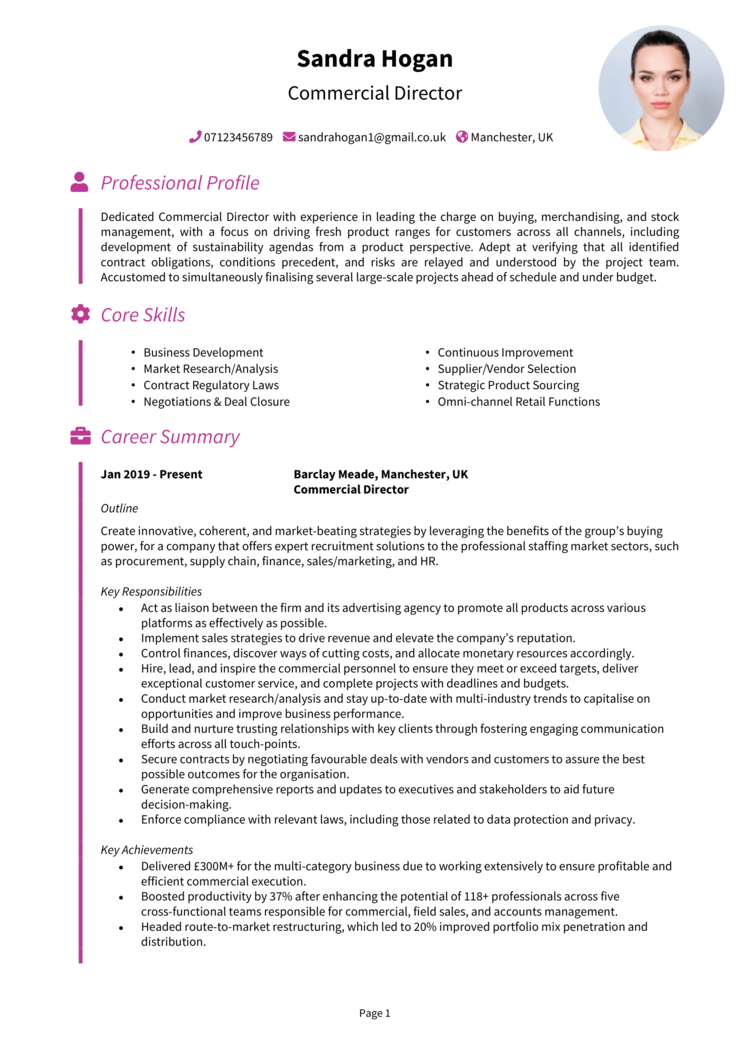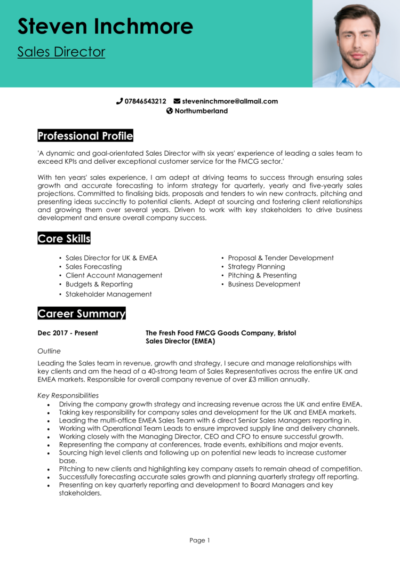Candidates hoping for a senior role will need a CV that proves that they deserve it.
You’ll need to convey your ability to lead, innovate, and above all else, deliver real results.
This Director CV examples and its expert step-by-step guide will equip you with a CV that convinces hiring managers you can drive business success, helping you land those coveted jobs.
Director CV example

Board Director CV example

Executive Director CV example

Commercial Director CV example

How to write your Director CV
Discover how to craft a Director CV that lands interviews with this simple step-by-step guide.
Your experience, achievements, and leadership qualities will need to be presented in a way that instantly demonstrates your value to an organisation.
This guide will take you step by step through writing a CV that showcases your ability to manage teams and optimise operations. Once you’re done, you’ll have no trouble writing a CV that presents you as a capable director.
Director CV layout


As a senior leader, your CV needs to make an impact immediately. Recruiters and decision-makers reviewing director-level applications will focus on your key achievements, strategic thinking, and leadership abilities. A strong structure will make all of this important information easy for them to find.
Here’s the layout your CV should follow:
- Name and contact details – Ensure your name and personal details are easily visible at the top. A photo is optional and depends on the role.
- Profile – Craft a short introduction that showcases your professional background and key accomplishments.
- Core skills – Quickly bullet point your essential abilities, such as business strategy, operational leadership, and stakeholder management.
- Work experience – Walk through your previous roles, highlighting major projects, business growth, and leadership impact.
- Education – Show off relevant degrees, executive training, and leadership certifications.
- Additional info – You can add hobbies, board memberships, or awards here that reflect your skill and enthusiasm for the industry.
Director CV format


A director’s CV format must be polished, professional, and easy to read. Decision-makers at this level are busy, so the clearer and more structured your CV is, the more effectively it will showcase your value.
To ensure your CV makes the right impression, follow these formatting tips:
- Bullet points – Use clear, structured bullet points to highlight key responsibilities and achievements.
- Divide sections – Make it easy to navigate by keeping your CV well-organised and neatly formatted.
- Use a clear and readable font – Focus on readability with a professional design and font choice.
- No more than 2 pages – This length ensures your highlights are front and centre while avoiding unnecessary fluff.
Director CV profile


Your CV profile is the first thing hiring managers will read, so it should quickly establish your credentials, leadership qualities, and industry expertise. This section should highlight your ability to deliver results and lead organisations to success, expressing the tangible value you’d bring to a company that takes you on board.
Director CV profile examples
Profile 1
Strategic and results-driven Director with six years of experience in business leadership, financial management, and operational strategy. Skilled in driving company growth, managing high-performance teams, and overseeing multi-million-pound budgets. Adept at stakeholder engagement, risk management, and long-term business planning. Committed to delivering sustainable growth and operational excellence.
Profile 2
Experienced Director with five years of expertise in leading corporate strategy, business development, and process optimisation. Proven ability to increase profitability through effective leadership, cost reduction, and market expansion. Skilled in negotiation, financial analysis, and change management. Passionate about driving innovation and ensuring continuous business success.
Profile 3
Dynamic Director with over ten years of expertise in leading organisations, managing cross-functional teams, and executing high-impact business strategies. Skilled in mergers and acquisitions, revenue generation, and strategic planning. Experienced in driving operational efficiency, improving productivity, and enhancing company culture. Dedicated to achieving long-term business sustainability and success.
Details to put in your Director CV profile
Here’s what to include:
- Leadership experience – Mention the industries or sectors you’ve worked in and the scale of teams or businesses you’ve managed.
- Strategic expertise – Showcase your ability to set and execute high-level business strategies.
- Operational and financial impact – Highlight key business improvements, revenue growth, or cost-saving initiatives you’ve led.
- Stakeholder management – Demonstrate your ability to engage with executives, board members, and key business partners.
- Innovation and change management – If you’ve introduced new processes, expanded operations, or led business transformations, mention it here.
Core skills section


At this level, hiring managers expect to see high-level skills – focus on strategic planning, decision-making, and business growth. Your CV skills should give recruiters a quick insight into your capabilities.
They should align with the specific demands of a director role, whether that’s business development, financial oversight, or operational efficiency. If applying for a sector-specific role, tailor this section to reflect industry expertise.
Key skills that make a Director CV stand out
- Strategic Leadership – Defining company vision, setting long-term goals, and driving overall business strategy.
- Financial Oversight – Managing budgets, financial planning, and ensuring profitability while mitigating risks.
- Stakeholder Management – Building and maintaining relationships with investors, board members, clients, and key partners.
- Operational Efficiency – Streamlining business processes to enhance productivity, reduce costs, and improve performance.
- Business Development – Identifying growth opportunities, new markets, and strategic partnerships to expand the company’s reach.
- Risk Management and Compliance – Ensuring adherence to industry regulations, corporate governance, and legal requirements.
- Decision-Making and Problem-Solving – Making high-impact decisions based on data analysis, market trends, and business intelligence.
- People and Culture Leadership – Leading teams, fostering a strong company culture, and ensuring employee engagement and development.
- Crisis Management – Handling unexpected challenges, such as financial downturns, reputational risks, and operational disruptions.
- Innovation and Change Management – Driving business innovation, adapting to industry changes, and leading transformational initiatives.
Work experience


Hiring managers expect director-level candidates to demonstrate impact, not just responsibilities. Your work experience section should focus on leadership achievements and measurable business growth. At this career stage, your work experience should read like a business success story, not just a career history.
If transitioning into a director role for the first time, highlight high-level leadership experience from previous senior management roles to demonstrate readiness for greater responsibility.
Structuring your jobs

- Outline – Provide a brief introduction to the organisation, its size, and your role within it.
- Responsibilities – Detail the key leadership duties, such as overseeing operations, driving strategy, or managing large teams. Use action words like “led,” “developed,” and “implemented.”
- Achievements – Highlight measurable success, such as increased revenue, improved efficiency, or business expansion.
Work experience samples for a Director
Managing Director | Peak Enterpises Ltd
Outline
Led overall business operations at a multinational corporation, overseeing strategic planning and financial management to drive company growth, profitability, and market expansion.
Responsibilities
- Developed and implemented long-term business strategies, ensuring sustainable growth.
- Managed a team of senior managers, setting performance targets and driving operational efficiency.
- Oversaw financial planning, budgeting, and risk assessment to maintain profitability.
- Led expansion efforts, including market entry strategies and strategic partnerships.
- Engaged with key stakeholders, including investors, suppliers, and board members.
Achievements
- Increased company revenue by 40 percent through strategic business development initiatives.
- Successfully led a corporate restructuring programme, improving operational efficiency by 25 percent.
- Expanded business operations into three new international markets, boosting company valuation.
Operations Director | Pinnacle Logistics
Outline
Managed company-wide operational strategies for a logistics and supply chain firm, ensuring efficiency, cost-effectiveness, and strict compliance with industry regulations and service standards.
Responsibilities
- Developed and streamlined supply chain processes to reduce costs and improve delivery efficiency.
- Led a team of department heads, ensuring seamless collaboration across operations, finance, and HR.
- Implemented new technology solutions to enhance productivity and operational control.
- Analysed key performance indicators to identify growth opportunities and mitigate risks.
- Ensured compliance with regulatory requirements and health and safety standards.
Achievements
- Reduced operational costs by 30 percent through supply chain optimisation.
- Implemented a digital transformation strategy, improving efficiency by 40 percent.
- Recognised for driving a major process improvement initiative that increased productivity.
Commercial Director | Leetech Solutions
Outline
Directed sales, marketing, and business development activities at a technology company, driving revenue growth, strengthening brand positioning, and expanding market share in a competitive industry.
Responsibilities
- Developed and executed commercial strategies to expand market reach and increase revenue.
- Led a team of sales and marketing professionals, setting performance objectives and sales targets.
- Negotiated high-value contracts with key clients and business partners.
- Conducted market research to identify trends, competitive positioning, and business opportunities.
- Managed commercial risk, ensuring long-term profitability and sustainable growth.
Achievements
- Grew company revenue by 50 percent through targeted business development strategies.
- Secured multi-million-pound contracts with global clients, strengthening market position.
- Recognised for implementing a customer-focused sales strategy that improved client retention.
Education and qualifications


Education is important at director level, particularly in industries where executive qualifications, MBAs, or specialist training enhance credibility. That said, years of experience are more valued, so keep your education section relatively brief, focusing on the most relevant and prestigious qualifications.
List your degrees, leadership training, or any executive development programmes that add weight to your application. If you’ve undertaken relevant business or strategy courses, these should also be included.
What qualifications do employers look for in a Director CV?
- MBA (Master of Business Administration) – A strong qualification for strategic and executive leadership.
- Chartered Management Institute (CMI) Certification – Recognised leadership training for senior professionals.
- Project Management Certification (e.g., PRINCE2, PMP) – Beneficial for directors overseeing large-scale projects.
- Executive Leadership Programmes (e.g., Harvard, INSEAD, London Business School) – Adds credibility to high-level leadership experience.
- Industry-Specific Certifications (e.g., Chartered Financial Analyst, CIM for Marketing Directors) – Strengthens sector-specific expertise.





